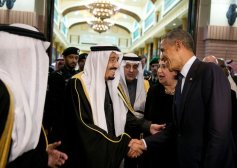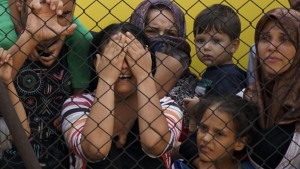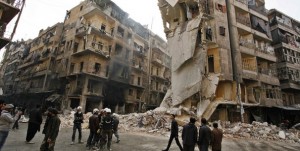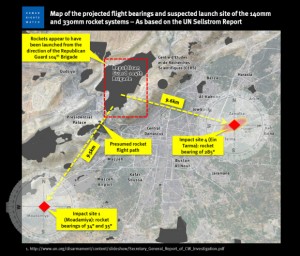[Ed. note – Bashar Assad, the evil “dictator” who “kills his own people” but yet somehow inexplicably visits churches on Christmas and finds himself surrounded by joyous parishioners, is back in the news again–and this time, one mainstream media outlet has the goods on him for sure!!!!!!
The New Yorker, seemingly just in time for the imminent collapse of the Syrian peace talks, has stumbled upon a “truckload of captured Syrian government documents” proving, once and for all, Assad’s involvement in a litany of crimes so terrible the human imagination can scarcely comprehend or even conceive of. No doubt the US and its allies will either have to intervene on behalf of the poor Syrian people suffering under the tyranny of this mad man, or at the very least they will need to supply the gallant, moderate Syrian rebels with advanced anti-aircraft weapons capable of shooting down Russian planes–strictly, of course, for the sake of ridding the world of this terrible menace.
Or at least that’s what we’ll be expected to believe. And naturally some will believe it. But many others won’t, and the New Yorker piece spoken of in the article below may be a good example of why only 6 percent of Americans any longer trust their media. ]
Now that Syria’s “cessation of hostilities” appears to be crumbling and rebel forces are gearing up for a fresh offensive, the mighty U.S. propaganda machine is once again up and running.
A case in point is “The Assad Files,” an 11,000-word article in last week’s New Yorkerthat is as willfully misrepresentative as anything published about Syria in the last five years or so, which is saying a great deal.
Written by a young Columbia Journalism School graduate named Ben Taub, it tells of a Canadian political entrepreneur named William Wiley who, starting in 2012, persuaded the European Union and the German, Swiss, Norwegian, Danish and Canadian governments to give him millions of dollars so he could begin building a criminal case against Syrian President Bashar al-Assad.
To that end, Wiley hired lawyers, translators, and analysts and sent investigators into Syria itself alongside “moderate” rebels so that they could rifle security and intelligence installations in search of incriminating evidence. Once they got what they were looking for, they either squirreled it away locally or spirited it over the border to an undisclosed location in Western Europe where the documents could be scanned, bar-coded, and safely secured.
The upshot is a 400-page legal brief that Taub says “links the systematic torture and murder of tens of thousands of Syrians to a written policy approved by President Bashar al-Assad, coordinated among his security-intelligence agencies, and implemented by regime operatives.” It is “a record of state-sponsored torture,” he adds, “that is almost unimaginable in its scope and its cruelty.”
Taub fills his article with lots of J-school-style color, informing us that Wiley is “a field guy, not an office guy”; that he “handles the considerable stress of his profession with Cuban cigarillos, gallows humor, and exercise,” and that, at age 52, “he bench-presses more than three hundred and fifty pounds.” He describes in vivid detail one of Wiley’s associates negotiating his way through 11 rebel checkpoints while transporting a truckload of captured Syrian government documents. But for all his diligence, he manages to overlook the blindingly obvious problems that Wiley’s activities raise. For instance:
–He notes that no international judicial body has jurisdiction over Syrian war crimes and that, in May 2014, Russia and China specifically vetoed a UN resolution assigning the International Criminal Court such a role. So what’s the point of a 400-page legal brief if there’s no court to present it to? Is this a genuine pursuit of legal truth or just another propaganda exercise funded by the West?
–Waving such objections aside, Taub quotes Wiley as saying: “We’re simply confident – and I don’t think it’s hubris – that our work will see the light of day, in court, in relatively short order.” But what on earth does this mean? That Wiley has inside knowledge that Assad is about to fall?
Western Crimes
–By zeroing in on Assad alone, the investigation ignores malfeasance by other players. Arming rebels and sending them to spread terror across the Syrian countryside, for example, is a straight-out violation of the UN Charter, which declares that “all members shall refrain in their international relations from the threat or use of force against the territorial integrity or political independence of any state.”
Syrian women and children refugees at
Budapest railway station. (Photo from Wikipedia)
Yet Wiley says nothing about such crimes even though the U.S. and Saudi Arabia commit them daily. The same goes for bombing Syrian targets without express Syrian government permission. That, too, is illegal. Yet Wiley remains silent about that as well.
–Sending investigators into Syria without express government approval is likewise a violation, which means that Wiley and his group are also complicit. Washington would not like it if Syria sent “investigators” to this country to break into FBI offices and rifle through CIA files. So what gives Wiley the right to do the same? And given the intensity of the propaganda war surrounding Syria, what weight should one give to the purported evidence?
Although you wouldn’t know it from a travesty like “The Assad Files,” the facts about Syria have long been clear. In August 2012, the U.S. Defense Intelligence Agency issued a report stating that Al Qaeda, the Salafists, and the Muslim Brotherhood were “the major forces driving the insurgency in Syria,” that their goal was to establish a “Salafist principality” in eastern Syria, and that this is “exactly what the supporting powers to the opposition” – which is to say Turkey, the Arab Gulf states, and the Western powers – “want in order to isolate the Syrian regime.”
In October 2014, Vice President Joe Biden told students at Harvard’s Kennedy School that “the Saudis, the emirates, etc. were so determined to take down Assad and essentially have a proxy Sunni-Shia war [that] they poured hundreds of millions of dollars and tens of thousands of tons of military weapons into anyone who would fight against Assad, except the people who were being supplied were Al Nusra and Al Qaeda.” (See quote starting at 53:20.)
In October 2015, a New York Times editorial noted that private donors in Saudi Arabia, Qatar and Kuwait were continuing to channel funds to ISIS (also known as ISIL, Islamic State, and Daesh), while, in January 2016, the newspaper reported that Saudi aid to Islamist rebels in Syria has totaled not hundreds of millions of dollars as Joe Biden had stated, but billions.
In other words, the U.S. and its Arab Gulf allies lavished immense funds on a Sunni fundamentalist rebellion from the start, they encouraged the growth of Salafist caliphate, and they stood by as private money flowed to Al Qaeda and Islamic State.
This is a scandal that people should be shouting about from the rooftops. Standing reality on its head, however, The New Yorker wants us to believe that the only person to blame for this debacle is Assad. If he hadn’t disregarded Barack Obama’s order to step down in August 2011, then America and its allies would not have been obliged to fund jihadists bent on installing a Sunni dictatorship in Damascus.
Through his obstinacy, Assad forced the U.S. to back a religious war of extermination against Alawites, Christians and other minorities, which is why Washington now has no choice but to arrest him, give him a fair trial and then find him guilty as charged.
Cooking the Books
Taub cooks the books in various ways. He devotes much of his article to a 38-year-old dissident named Mazen al-Hamada who says he spent a year in Assad’s prisons, suffering repeated beatings and emerging a broken man as a consequence.
“People went crazy,” he tells Taub of his time inside. “People would lose their memories, people would lose their minds.” Even though Hamada was eventually able to leave Syria and join his sister in the Netherlands, he spends his days agonizing over the friends and relatives he left behind.
“Where are they?” he cries. “Are they alive? Are they dead?” Every day is “misery,” he tells Taub. “It’s misery. It’s misery. It’s death. It’s a life of death.”
This is powerful stuff, especially for those who enjoy reading about evil Arab dictators. But the careful reader will notice that Hamada has no connection to Wiley’s campaign and that his role, rather, is to put flesh on the bones of Wiley’s dry legal arguments by describing what’s at stake.
Taub thus goes into painful detail about the tortures that Hamada says he endured – beatings, burnings, electric shock, and so on. It’s gruesome stuff, and, according to Taub, Hamada “sobbed desperately” in recounting it.
A general view showing damages after what activists said was an airstrike with explosive barrels from forces loyal to President al-Assad in Al-Shaar area in Aleppo
But what did Hamada do to merit such treatment, if indeed such abuses were inflicted? The article says only that he comes from an educated middle-class family in the city of Deir Ezzor and that members “were outspoken critics of the government, and even before the revolution they were routinely followed and periodically arrested. They were especially outraged by the government’s failure to do anything about the widening gap between the rich and the poor. ‘It was all organized to benefit the élites,’ Hamada said.”
This makes them sound like Bernie Sanders supporters. Taub adds that Hamada also organized inside a local mosque but assures us that it was just a matter of convenience.
“It was a logistical issue,” he quotes Hamada as saying. “Everyone went to the mosque on a Friday, everyone came out. … If we could have come out of churches, we would have come out of churches!”
But is that really all there is to it? In fact, Deir Ezzor is part of Syria’s wild east, a tribal region that was an Al Qaeda stronghold following the U.S. invasion of Iraq in 2003 and then again after the Arab Spring beginning in early 2011.
“The religious and tribal powers in the [border] regions began to sympathize with thesectarian uprising,” states the 2012 Defense Intelligence Agency report, written just a few months after Hamada’s arrest the following March. (emphasis added). “This sympathy appeared in Friday prayer sermons, which called for volunteers to support the Sunni’s [sic] in Syria.”
So what The New Yorker doesn’t tell us is that Hamada agitated inside mosques at a time when they were resounding with calls for holy war against Assad and his fellow Alawites. This doesn’t prove that Hamada is not a liberal, a social democrat, or some other mild-mannered sort. But it raises the possibility that he’s something else – a Salafist, perhaps, a Wahhabist, or a supporter of Al Qaeda.
A One-Sided Morality Play
If Taub seems stingy with the details, it’s most likely because he doesn’t want anything getting in the way of his simple-minded morality play about a noble dissident suffering at the hands of a cruel and vicious tyrant.
But how do we know Hamada suffered at all? How do we know he’s not making it all up? Taub summons up bits and pieces of corroborative evidence in an effort to buttress his account, none of it terribly convincing.
Hamada says that after he and his fellow prisoners were transferred to an air base at Al-Mezzeh, a few kilometers west of Damascus, guards taunted them by saying that the Americans would soon bomb the installation, killing them all.
The controversial map developed by Human Rights Watch and embraced by the New York Times, supposedly showing the flight paths of two missiles from the Aug. 21 sarin attack intersecting at a Syrian military base. The map’s claims ultimately collapsed when inspectors could find no sarin or other chemical weapons agent in the rocket to the west and the rocket to the east, which did carry sarin, was discovered to have a range of only two kilometers, with the base nine kilometers away.
Since Obama was threatening to retaliate against Syria for the use of sarin gas a few days earlier and “at least one of the sarin-gas rockets is believed to have been launched from the base at al-Mezzeh,” according to Taub, the story seems to make sense.
Members of the United Nations inspection team, which gained access to the site five days later, found no evidence of sarin from their field tests, a result later confirmed by two U.N. labs, which reported no sarin or other chemical weapons agents present, although the two labs had conflicting findings on whether a trace chemical from the area might have resulted from degraded sarin.
But even that suspicion was undercut by the fact that a second rocket recovered in the Ein Tarma/Zamalka area several days later tested positive for actual sarin (though it had been exposed to the elements even longer). That crude second rocket was later determined to have a range of only about two kilometers, meaning that it could not have come from the Syrian base and more likely came from rebel-controlled territory. Later evidence, including a report by investigative reporter Seymour Hersh, pointed to the likelihood that it was launched by rebel jihadists as a provocation to draw the U.S. military into the conflict on their side.
There was also the question of why Assad would have invited in U.N. inspectors to examine a prior chemical attack against his troops and then launch a large-scale sarin attack on a nearby location just as the investigative team was settling into a Damascus hotel.
As the excellent open-source “WhoGhouta” blog points out, it doesn’t make sense unless the Baathists were bent on suicide – and if there’s one thing we know after five years of civil war, it is that the Damascus regime’s goal is not suicide but survival. [See also Consortiumnews.com’s “A Call for Proof on Syria-Sarin Attack.”]
Of course, it is possible that Hamada’s Syrian guards might have anticipated a U.S. attack even if Assad’s government had nothing to do with the sarin attack. But the dubious case surrounding the sarin gas incident leaves his account sounding contrived and unsubstantiated, an example of old anti-Assad propaganda being dredged up in support of yet another round of lies and distortions.
Dubious Photos
Taub also invokes the famous “Caesar,” the pseudonym of a Syrian army photographer who caused a sensation in early 2014 by defecting with 55,000 photographs purportedly documenting the torture and killing of 11,000 detainees at the hands of the Syrian security establishment.
Where Hamada says he was assigned a four-digit identification number during his confinement, many of Caesar’s victims were also tagged with a four-digit ID, which makes Hamada seem more plausible. Where Hamada reported a pile-up of dead bodies at the hospital in which he was interned, Caesar, clicking away at the same facility, also reported a gruesome pile-up. If Caesar is believable, then Hamada is as well.
But Caesar’s tale fairly cries out skepticism. For instance:
–His publicity campaign was paid for and organized by Qatar, a key backer of Islamist rebel groups, which also engaged a London law firm to testify that the photos were genuine.
–The photos were hurriedly released just as peace talks in Geneva were about to begin, talks that Qatar and its rebel allies both opposed.
–Rather than victims of the regime, an examination by Human Rights Watch found that nearly half the pictures were of dead army soldiers, members of the security services, or victims of fires and car bombs – i.e. victims not of the government, but of the rebels.
–A further examination by the Syria Solidarity Movement found that significant numbers of photos showed fresh bullet or shrapnel wounds suggesting that the victims had died in combat rather than in prison; signs of bloating suggesting that they had also perished in conflict zones; or bandages indicating that they had died after receiving medical treatment.
Where Hamada, moreover, said that dead bodies were stored in toilets of all places – guards instructed him to “pee on top of the bodies,” he assures a credulous Taub – the bodies that Caesar photographed were stored in a morgue or in a garage bay.
Caesar’s photos thus prove absolutely nothing about the Assad regime in general or about Hamada’s experience in particular. Since their evidentiary value is nil, we have no reason to believe that he is telling the truth as opposed to filling a young reporter’s head with stuff and nonsense designed to set his editor’s pulse racing back in New York.
The result is every bit as outrageous as the articles The New Yorker ran prior to the 2003 invasion of Iraq alleging collusion between Al Qaeda and Saddam Hussein.
The Christian Science Monitor, one of the few publications not to tumble into bed with Caesar and his photos, described them as “a well-timed propaganda exercise funded by Qatar, a regime opponent who has funded rebels fighting Assad who have committed war crimes of their own.”
With the White House preparing to up the ante in Syria by possibly supplying the rebels with portable anti-aircraft missiles — weapons that will almost inevitably find their way into the hands of ISIS and Al Qaeda – is there any reason to regard “The Assad Files” as anything other than a well-timed propaganda exercise as well?
Daniel Lazare is the author of several books including The Frozen Republic: How the Constitution Is Paralyzing Democracy (Harcourt Brace).





















